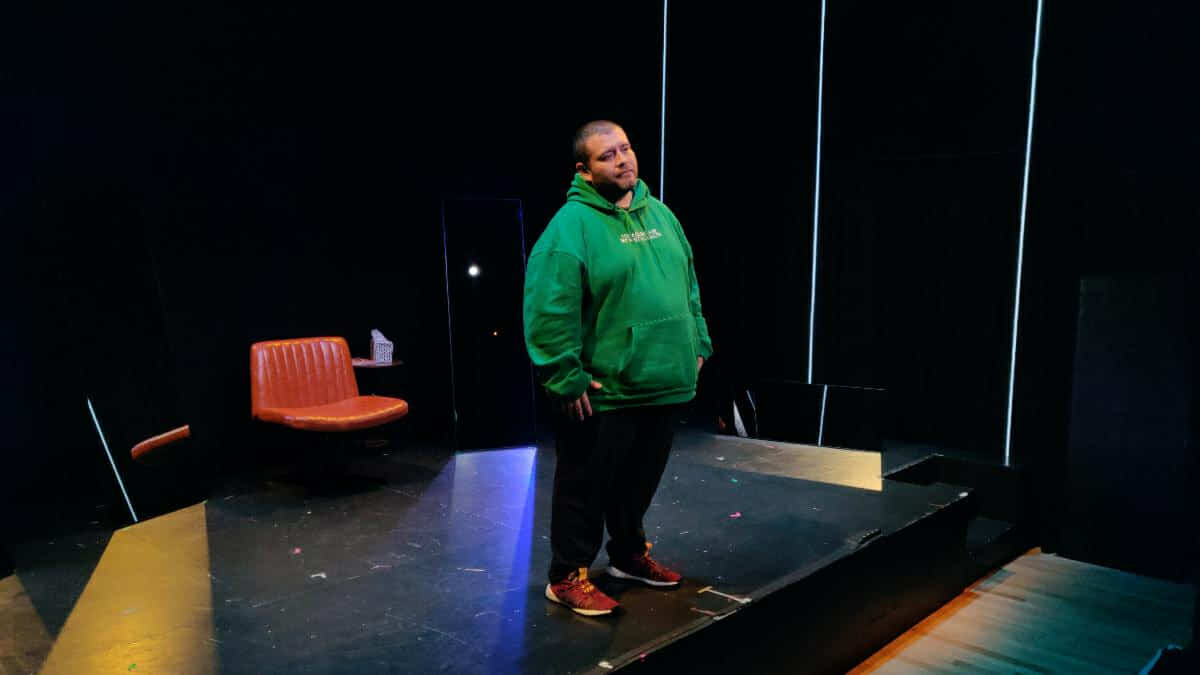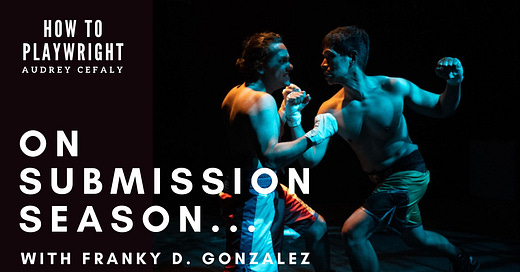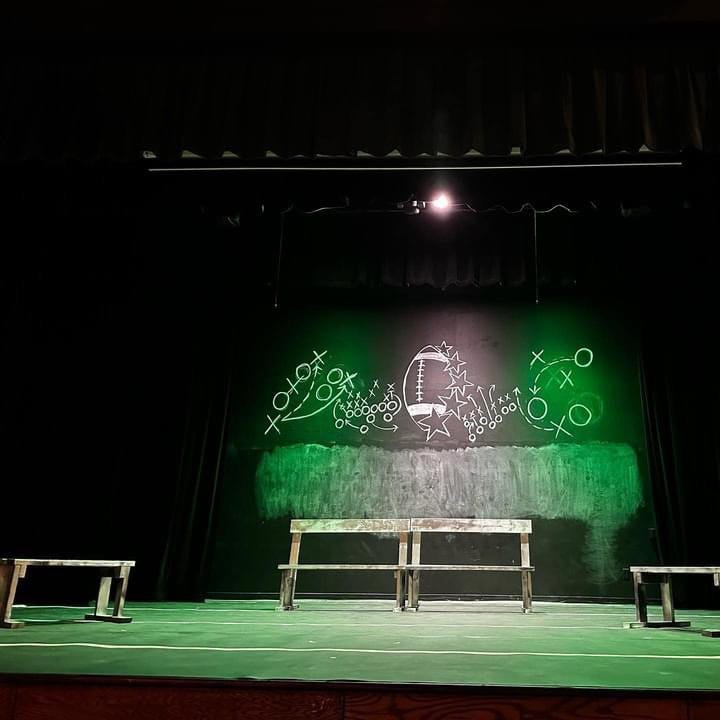On Submission Season...
It's that time of year, from September to January, when playwrights make their case.
It's that time of the year from September till around January where playwrights make their case to be selected for the various opportunities offered by development organizations and theatres across the country who open up their doors for development, readings, and possible productions.
I see playwrights setting up accountability groups or coming up with strategies to write a new play to send out every year to these organizations. I see the cynicism from others who call the game rigged. I see a lot of emotion.
But most of what I've been seeing, especially of late, is pain.
Hustle culture, constant expectation to produce, to exceed what was created before has now replaced making art for the joy of it. People are trying to keep up with trends, trying to write to a moment, trying to create things that these organizations "will like." Or worse, the cynical, sending something just for the sake of sending something, even if the plays don't necessarily fit the guidelines. The thinking--as I understand it--is that the play will be so good that they'll make an exception, surely.

Then I'm seeing on the other side a lot of administrators getting exhausted by the sheer volume of plays coming in. They're getting overwhelmed by the plays coming in that are half-baked and not ready for next steps. They're getting statements that don't speak to their institutional mission, or even to the call at all. It takes away the joy of even reading plays.
Then when the rejections come, the playwrights feel hurt. They start making insinuations about the fairness of the play submission process, they question their own art, they grow more and more bitter with each passing season of rejection. The administrators grow frustrated and try to improve processes to address all concerns, creating more and more criteria to consider year after year. And for everyone, equally? Exhaustion.

It's burning the candle on both ends and then lighting another flame right in the middle. It's diminishing the joy of this artform.
I'm a product of submission season's success. I have been able to experience such wonderful opportunities and have forged friendships that feel like they'll last the rest of my days. There are so many places that I want to see my works receive development and support even now. But recently, I've been submitting plays that, frankly, don't need anymore development, or that I'm not terribly excited about because it was born of this hustle mentality that's taken over.
I don't like that feeling.
So, I've decided I can't rush things anymore. I won't. I want to send plays that I'm genuinely excited about and need to work on. I'm not going to send things anymore just to keep my name on people's minds. I want to find the love of writing again. I'm not going to pressure myself to have a new play a year. I'm not going to push out work that's half-baked and is not something I am proud of. My name doesn't have to be there every year. If an opportunity comes that feels right, then I'll send. But I'm not going to try to get every opportunity out there. It's time to start working with more of a mind toward aligning with opportunities that fit with my trajectory, rather than trying to get people to give me a chance.
My dreams will come true. But they're not going to come true exhausting myself and wasting the time of people who have become friends to me. They're not going to come sending the same play for the third time in four years. The dreams will come true when I've created something that came from the same place that launched my playwriting journey at the national level.
And for that, I have to stop competing and start writing.
I don't know why I've written this. Maybe as a way to reach out to others who feel exhausted, too.
Either way. Happy submitting to all of you. I hope your dreams will come true and that I can join you there one day.
For now, I'm going down another road.

FRANKY D. GONZALEZ, PLAYWRIGHT
As an artist, I aim to create works that explore underrepresented individuals or present voices and perspectives that are not traditionally heard by the typical theatre-going audience. Through the exploration of the underrepresented and the historically voiceless, I hope to inspire conversation and eventual relationship building between the heard and the unheard.
Franky D. Gonzalez ("That Must Be the Entrance to Heaven," "Escobar's Hippo," "Even Flowers Bloom in Hell, Sometimes," "Paletas de Coco," and "Heart Stop.") is a playwright and TV writer of Colombian descent splitting time between Dallas and Los Angeles. He holds a BA in Theatre from the University of North Texas and has had his work featured throughout the Dallas-Ft. Worth metroplex where he served proudly as the Dramatists Guild Regional Representative in 2018. Nationally, his work has appeared with The Lark, the Sundance Institute, the Ojai Playwrights Conference, Berkeley Repertory Theatre's Ground Floor, the NNPN National Showcase of New Plays, the Latinx Playwrights Circle, the Texas State University's Black and Latino Playwrights Celebration, The Sol Project, Urbanite Theatre, Visión Latino Theatre Company, The Orchard Project, the Great Plains Theatre Conference, the Goodman Theatre, Launch Pad at UC Santa Barbara, The New Harmony Project, Bishop Arts Theatre Center, Repertorio Español, LAByrinth Theater Company, Ars Nova (ANT Fest 2021), Dallas Theater Center, the William Inge Theatre Festival, American Blues Theatre (Ripped Festival), Austin Latinx New Play Festival, South Texas College Theatre Latinx New Play Festival, Stages Repertory Theatre's Sin Muros Latinx Theatre Festival (2019 and 2024), the Latino Theatre Company’s RE:Encuentro 2021: National Virtual Latina/o/x Theatre Festival, the Latinx Theatre Commons, Seven Devils New Play Foundry, Tofte Lake Center, Ignition Arts, ProEnglish Theatre of Ukraine, Clamour Theatre Company, Ammunition Theater Company, The Mid-America Theatre Conference, The Midwest Dramatists Conference, and the One-Minute Play Festival. Franky was a recipient of the Charles Rowan Beye New Play Commission, an MTC/Sloan Commission, the Risk Theatre Modern Tragedy Prize, co-recipient of the MetLife Nuestras Voces Latino Playwriting Award, won the Crossroads Project Diverse Voices Playwriting Initiative Award, the Judith Royer Award for Excellence in Playwriting, the Short+Sweet Theatre Festival Manila Best Overall Production Prize, and was a staff writer for the fourth season of 13 Reasons Why. Productions of his work have also been recognized garnering two Non-Equity Jeff Awards in Chicago for Short Run Production and Short Run Director in 2024. Previously he was a 4 Seasons Resident Playwright, a Sony Pictures Television Diverse Writers Program Fellow, a Core Writer with the Playwrights Center, and is currently the Bishop Arts Theatre Center Playwright-in-Residence.
Learn more about Franky: https://newplayexchange.org/users/6600/franky-d-gonzalez

MORE FROM HOW TO PLAYWRIGHT
52 Vocabulary Words for Playwrights
A collection of weird and unusual words for the things we do as playwrights.10 Things Playwrights Wish Their Actors Understood
A love letterTo Speak or Not to Speak?
4 Ways to Create Indelible Non-Speaking Roles for the Stage21 Things I Know About Playwriting
I wrote my first play twenty years ago. I wrote my second play one year later. Here are 21 things I learned in the year between the two.
LEAN MORE ABOUT AUDREY
Visit my website for more about me and the work I do!
QUICK LINKS TO MY PLAYS
Audrey Cefaly's plays (Alabaster, Maytag Virgin, The Gulf, The Last Wide Open, Trouble) have garnered the Lammy Award, the Calicchio Prize, the NNPN Goldman Prize, the Edgerton, and a Pulitzer nomination. Her works have been produced at Signature Theatre, Cincinnati Playhouse, Barter Theatre, Merrimack Rep, Florida Studio, Florida Rep, Gulfshore Playhouse, and countless others. Cefaly is a Dramatist Guild Foundation "Traveling Master," an Arena Stage playwright cohort, and a recipient of the Walter E. Dakin Fellowship from the Sewanee Writers Conference. She is published by Concord Theatricals, Applause Books, Smith & Kraus and TRW
Thanks for reading How To Playwright!









I related to this. I took myself out of the submissions game for a few years - partially because of the pandemic, and partially because I felt burned out and resentful. What surprised me is that even though I took a break, all that submitting I did bore fruit when things opened back up. I didn’t write a play for three years, but on paper, I had the best few years professionally. Now I’m back and I’ve written two new plays over the past two years that excite me, so I’m back to submitting a bit. And hey, you can’t win if you don’t play.
Great article. Thank you for sharing this. And Franky…your bio is unbelievable! You’ve worked hard and have accomplished so much already.
Sadly, all the arts are this way now. It didn’t feel like this 20 years ago when I was just out of undergrad.
In the literary world, the causes are many. I assume it’s similar for playwriting. Too many MFA programs creating too many writers who instantly expect to be successful. Too easy access due to an electronic submission system, and not enough money to fund the arts. There are many other reasons but the scarcity mentality coupled with high level competitiveness and a system that pretends its meritocratic but really isn’t is so detrimental to writers (playwrights, novelists, poets) and artists. Also, the idea of “making it” doesn’t help. Yes, doors open when you win major awards or are recognized but the practice is never done. You can choose to claw your way to the top and become miserable in doing so or you can enjoy the process and your life. I really do not want to see other writers as my competitors. We are all barely able to make ends meet unless we come from wealth or have a full-time job that is likely unrelated to our art form.
I took myself out of this system long ago and now approach it through an entrepreneurial lens. Sometimes you have to grow your own projects over time and find the community that has a similar approach. You will probably not be recognized nationally but if you aren’t enjoying the art you practice then the accolades are meaningless.